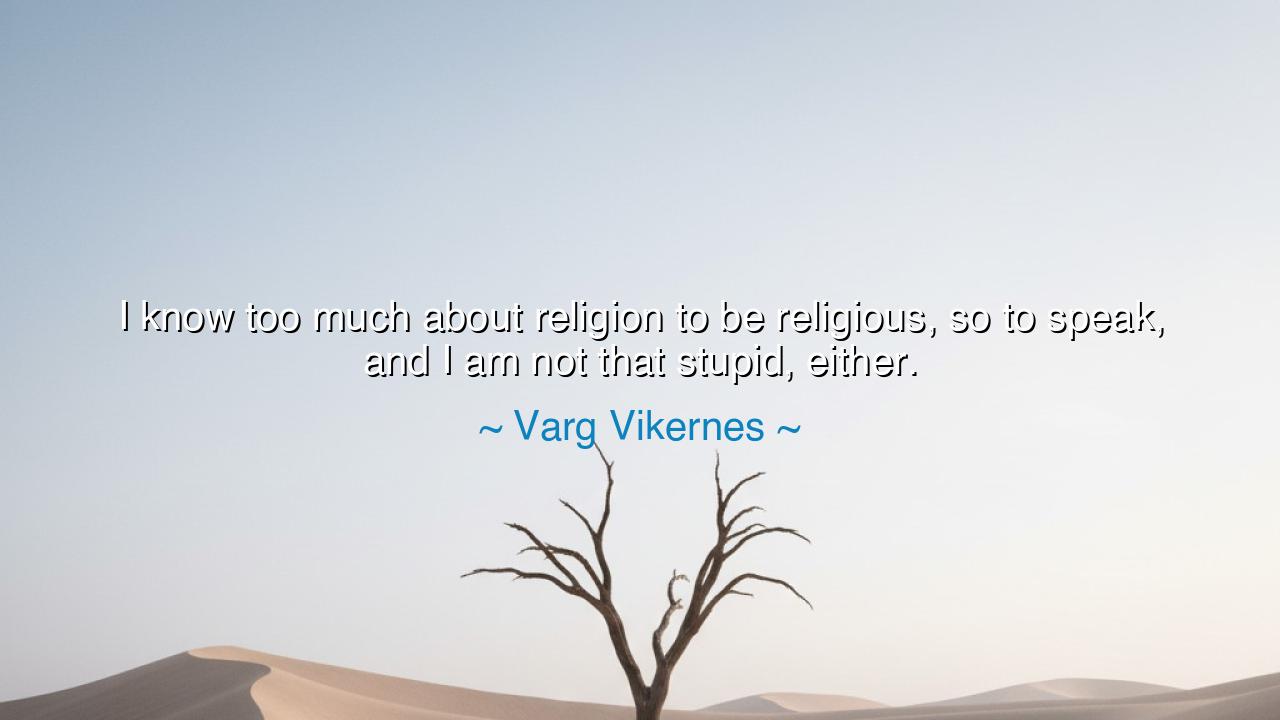
I know too much about religion to be religious, so to speak, and
I know too much about religion to be religious, so to speak, and I am not that stupid, either.






Varg Vikernes, with a voice sharp as iron and heavy with defiance, once declared: “I know too much about religion to be religious, so to speak, and I am not that stupid, either.” In these words we hear not only the bitterness of rebellion, but the cry of a man who has wrestled with the structures of faith and found them wanting. He speaks as one who has walked through the temples, studied the scriptures, and gazed behind the curtain of ritual, only to declare that the light there was not for him. His statement is not gentle doubt—it is scorched conviction, the refusal to be bound by systems he believes crafted by men rather than gods.
The ancients themselves knew such voices. The philosopher Lucretius, in his poem On the Nature of Things, wrote against the fear of the gods, proclaiming that men enslaved themselves by imagining divine punishments where none existed. For him, to be wise was to see through the illusions of religion, to live freely according to reason and nature. Vikernes stands in this same lineage: those who claim that knowledge of religion—its origins, its structures, its power over men—dissolves the possibility of simple faith. To him, belief is ignorance, and knowledge is liberation.
History bears the weight of this conflict. Think of Giordano Bruno, who studied deeply the teachings of his age, but saw further: the stars were infinite, the universe vast, and no creed could contain it. His knowledge led him beyond the bounds of orthodoxy, and for this he was condemned to the flames. His fate shows us the peril of knowing too much in a world where power clings to dogma. Like Vikernes, he might have said: “I cannot return to belief, for I have seen what lies behind the veil.”
Yet Vikernes’ words, though sharp, also carry a shadow of arrogance. To say “I am not that stupid” is to cast judgment upon the billions who hold faith dear. Here the ancients would counsel humility, reminding us that wisdom is not only the ability to see through deception, but also the ability to understand the hearts of others. Religion, though imperfect, has given meaning, courage, and community to countless souls. To dismiss it entirely may free one man, but it may blind him to the treasures of beauty, poetry, and moral strength that faith has inspired across centuries.
The meaning of the quote, then, is double-edged. On one side, it is a call to awaken, to study deeply, to see how institutions of belief have often been shaped by politics, by power, by human ambition. On the other, it is a warning not to be enslaved by ignorance masquerading as truth. But it also risks hardening the heart, for true wisdom is not only in rejecting chains, but in discerning which parts of tradition may yet carry eternal value. To know too much is dangerous; to dismiss all is another kind of blindness.
The lesson is clear: knowledge demands responsibility. If you, like Vikernes, know the flaws of religion, do not only mock—seek the deeper truths that remain. Ask not only, What is false? but also, What is eternal? Study with courage, but live with humility, knowing that others may walk a different path with sincerity. To reject religion is one choice, but to reject compassion, awe, and moral discipline is to throw away the gold with the dross.
Practical actions flow from this. Study your tradition deeply—do not accept blindly, but also do not scorn lightly. Seek truth in reason, but also in art, in poetry, in the shared stories of humankind. Do not be enslaved by fear, but do not close your heart to wonder. And above all, respect those whose faith sustains them, for they too are seekers, walking a path as ancient as the stars.
O seeker, carry Vikernes’ fire, but temper it with wisdom. To know too much can free you from illusion, but if you turn only to scorn, you may chain yourself to pride. Walk instead the balanced path: learn, question, discern, and live with both courage and humility. For the goal is not to be “not stupid,” but to be truly wise—and wisdom is not destruction alone, but the building of a life rooted in truth.






AAdministratorAdministrator
Welcome, honored guests. Please leave a comment, we will respond soon